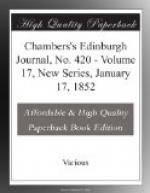There is little more to notice in the Royal Exchange, except that the interior decorations are very tastefully executed; and therefore turn we now to this leviathan Bank of England—to the long, irregular, and by no means imposing line of building on our left. This is William Cobbett’s Old Lady of Threadneedle Street, whose rickety constitution and failing powers—according to that bold and blundering financier—betokened almost immediate dissolution more than a quarter of a century ago. Other men, less dominated by unreasoning prejudice than the author of the ‘Political Register,’ deceived themselves into the same notion; and it is very possible that there are even now persons who hold the faith as it was in Cobbett—just as we are told in one of Mr Disraeli’s novels, that the Greek mythology is still the creed of a fragment of humanity existing somewhere in the mountains of Syria. At all events, since the late Sir Robert Peel placed it beyond the power of the governor and company to indulge in dangerous or erratic courses, it is abundantly manifest that to doubt of the perfect stability of the Bank of England is tantamount to questioning the infallibility of arithmetic. In the vaults and coffers of this huge establishment there is at present—as we learn from the published weekly-returns, a device of Sir Robert’s—the bewildering amount of between L.14,000,000 and L.15,000,000 sterling in gold and silver!—a sum of which the figures glide smoothly and glibly enough off the pen or tongue, but a mass of treasure, nevertheless, that few persons can realise to themselves a distinct and accurate conception of. And yet—and what an idea does the fact present of the multitudinous resources, the unrivalled industry, the latent power of this country!—all that heap of precious metals, all that is besides in circulation, with the




